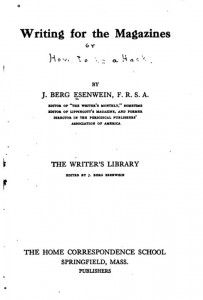Follow Scott
Recent Tweets
- Waiting for Twitter... Once Twitter is ready they will display my Tweets again.
Latest Photos
Search
Tags
anniversary Balticon birthdays Bryan Voltaggio Capclave comics Cons context-free comic book panel conventions DC Comics dreams Eating the Fantastic food garden horror Irene Vartanoff Len Wein Man v. Food Marie Severin Marvel Comics My Father my writing Nebula Awards Next restaurant obituaries old magazines Paris Review Readercon rejection slips San Diego Comic-Con Scarecrow science fiction Science Fiction Age Sharon Moody Stan Lee Stoker Awards StokerCon Superman ukulele Video Why Not Say What Happened Worldcon World Fantasy Convention World Horror Convention zombies
©2025 Scott Edelman
Writing advice from 1916—Part II
Posted by: Scott
Tags:
old books, old magazines
Posted date:
June 22, 2008 |
No comment
So it’s 1916, and you’ve just finished (or think you’ve finished) your latest short story—now what? Well, before you send it to market, eminent editor Dr. J. Berg Esenwein suggests that you ask yourself several questions.
Here, taken from an appendix to his instructional book Writing for the Magazines, are his “Points for Self-Criticism in Fiction Writing”:
1. Is my theme clearly reducible to a single brief expression?
2. Is my theme fresh, or treated from a fresh viewpoint?
3. Is my plot clear, progressive, and natural?
4. Is the complication (main crisis in the struggle) a real one, or does it seem artificial?
5. Is the outcome natural, yet surprising?
6. Is every vital action well motivated, or have I simply forced things to happen to fit my plot without suggesting convincing motives?
7. Have I introduced any useless incidents, delays and digressions?
8. Are there enough twists to keep the plot from being obvious?
9. Are the chief characters brought out prominently?
10. Is the dialogue bright, brisk, natural, suited to the characters?
11. Is the dialogue commonplace?
12. Does every part of the dialogue actually help to develop the story?
13. Are the opening and closing passages well suited to the style of story-telling I have selected?
14. Does the setting actually serve as back-ground for the action, or have I used it chiefly for its own sake?
15. Have I used any needless words?
16. Have I repeated any words when synonyms might better be used?
17. Are my sentences clear and grammatically correct?
18. Have I used a good variety of sentence forms?
19. Does each paragraph stand out as a little composition in itself, leading up to a climax of its own, and does it both naturally follow the preceding paragraph and prepare for the succeeding one?
20. Does the whole story drag at any point, or is the movement consistently rapid?
21. Is the tone of the story harmonious throughout, or does it shift its viewpoint?
22. Is the story well balanced, or is one part sacrificed needlessly to help the other?
23. Is the story long enough to bring out the plot in a well-rounded manner?
24. Is the story short enough to make it compellingly interesting?
25. Does the story leave precisely the impression I designed that it should?
These questions may have first been asked 92 years ago, but they still seem valid.

